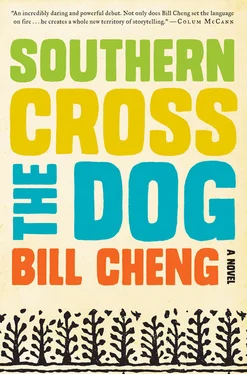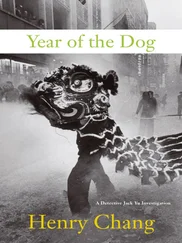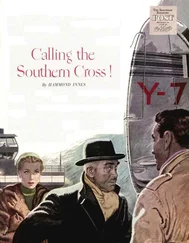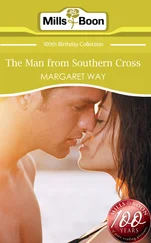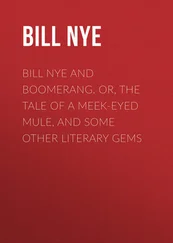I heard music, Robert said. I was curious. That’s all.
No. Little man, you don’t get curious. For you, music has no sound, food has no taste. And the days are endless.
You’re wasting my time, Robert said. He went to take his hands away, but Eli held firm.
There’s a woman, he said. A white woman.
Robert couldn’t speak. He didn’t move.
You did something with her. Something you shouldn’t have.
Yes, Robert heard himself say. He started at his own voice — small and trapped in phlegm.
And something happened. Something you can’t take back.
Yes.
Tell me, he said.
I… I’ve been seeing things. Sometimes I don’t know if I’m awake or if I’m dreaming, if what I’m seeing is real. I can’t feel my fingers, or my arms, or my body. Can’t feel inside my own skin.
Tell me, he said again.
It follows me. I see it. It’s always there. Just behind me, never letting me alone. No matter how far I get, where I go. It’s there. It’s always there. Like it’s always been there. It watches me.
What’s there? Say it.
The Dog, he said. He felt the word leave his mouth. It was the first time he had said it. Grief and fear surged through him. He could feel himself coming apart. The Dog, he said. Everywhere I go. It won’t leave me alone. It wants something from me and I can’t… I don’t…
Robert began shaking. He realized he’d been holding his hand out, and it made a claw now. He gripped it shut and rested it on his lap. His eyes were closed and his lip was trembling. There was a pain now, dividing through the numbness, a hot knife. He drew in a breath and tried to collect himself.
I can’t get clean of it.
Eli rested his hand on his shoulder. The touch felt like a wound. Tears stood in Robert’s eyes.
Help me, he whispered.
Eli stood up. Robert began to weep. He lifted his head slowly. It was a man’s face. Ordinary. The skin was rough and creased around the eyes and mouth. He looked into Eli’s eyes and he was disgusted by the plainness of his face, how much like an egg it looked. Slowly, a grin crept across Eli’s lips. His cheeks tensed. He was trying not to laugh, Robert realized.
Robert stood up and backed away. His face was burning. His heart was in his throat.
You-you told me, he managed to say. His voice was brittle and strange. Said we were tied to each other.
Who?
The Dog — that I was going to need it. That’s what you told me.
Eli laughed and shrugged. You were a boy! It was just something to say to a boy. Something I made up. You say a dog is following you?
Robert felt his stomach drop. Something you made up?
I can’t help you, he said. I’m sorry.
Go to hell, Robert said, starting toward the gate.
Eli glowed at him.
I have to admit, though, it was a pleasant surprise running into you. I didn’t expect to see you again. Still, it is entirely reasonable, don’t you think?
Go to hell, he said again.
Eli walked after him.
This is one thing I’ve learned. The one truth God has ever given to a man. And it’s that the past keeps happening to us. No matter who we are or how far we get away, it keeps happening to us.
Robert kept walking. He was in the street now. He could hear Eli calling after him from the gate, laughing.
ROBERT SPENT THAT NIGHT AT the bus station, turning over his choices. He paced the inside room, pocketing the pennies that’d fallen underneath the benches. He passed the station map again and again, pacing the length of the floor. He memorized the large swaths of unknown country, read out loud the Indian names, full of rolls and swallows — Pontotoc, Pascagoula, Natchez. He plotted the distance his money could take him. His eye found, again and again, the pale green thatch that is Issaquena County — then the bold curl of river west of it. All night, the buses trucked in and out and he watched the people in them. They were tired, as tired as he was, their journeys buzzing through their bodies. It was late and he was hungry and they smelled so much like health. A family of Mexicans came down and one of them, a small boy, was holding his mother’s hand, looking at him. Robert was sure he was disgusting to them — the filth of the swamp and sweat and dirt radiating off him. But the boy only stared, his eyes big and unreadable. He let go of his mother’s hand and moved cautiously toward the bench.
The boy came closer and Robert saw there was something wrong with him. The boy’s left eye stared away a little and had more black in it than the other one. The thought came over him that he looked kind of like a stick bug.
The boy stopped in front of him. Robert looked over at his parents, who were too busy arguing at the map wall.
Hello, Robert said.
The boy had something in his hand and he offered it up to him.
It was a wafer candy.
Cadejo, the boy said.
The candy hung there in the air for a second. Robert took it and it damn near broke him to pieces.
When we were young, I called you My Etta and we went down to the cotton fields without our clothes, falling on each other and laughing and full of young breath. And you said what you loved was my arms, how big they were, how they could wrap you up and hold you in like a little pea inside its pod. So I’d hold you and we’d look up at the sky, almost like we was daring it to rain.
We had years together, don’t forget, years when it was just you and me and we lived only for that warm thrumming inside each other — with no worry for what was coming or what had passed. We were outside of everything.
Then time finally came and we married. I moved us down to Issaquena where the soil was good for timber and Chathams both to set down roots.
Those early days, I’d come home bone tired from hauling timber and you’d be waiting with the dinner all hot, and the air inside our little cabin so goodly warm. But there was something, even then, I saw that wasn’t right. Something in your eyes, in that faraway look that you got sometimes.
I remember the night we had Billy. You were in with the midwife, while I was outside, my gut in my throat. I was on the porch looking out into the dark evening. It was summer and there were fireflies all around, and crickets going, and everything singing out the great mystery of the world. And then there was me, my feet turned to iron and the rest of me just reed brittle and terrified. There was so much in this world and I did not know if I could measure up.
The midwife came and fetched me, and I saw you lying there, tired but glowing. And she gave me this bloody mewling thing. It was so small, I was afraid to take it, afraid that it might break somehow.
But you looked at me, my Etta, and you said, Ellis, hold your boy.
And the midwife put the thing in my arms and I knew then it was mine, that I could hold up its small weight and I would exhaust every last drop of my blood to keep us safe.
We named him William Cornelius for my father, but around us he was Billy.
We worried ourselves sick. Every cry and whimper and gibbering noise would steal away our attention and fray our nerves. We would stay up nights, made raw, listening to our little new thing kick and whine.
In time, our boy grew up. The hair came in full and black, and his face was strong and handsome. You doted on him, Etta, called him your brave boy. You’d see him jump into the bushes and wrangle king snakes and racers and you’d say my, how that boy just full of sand. But I knew my boy. How proud he was. You wouldn’t believe me then, Etta, but when those snakes slithered out of their bushes, he was as afraid as we were. He just smothered it down, never letting on.
There were days I’d drive out with my partner, Skinny, on the mule cart, hauling our load over to the mill. And there’d be something in the air, maybe, some smell of magnolia or the look of a shadow on the road, and I would feel a change. Feel it right in my body. I knew I was no longer the person I was. What I mean is, so much of my life had been spent as one man — as one person — and now I was more than that.
Читать дальше
